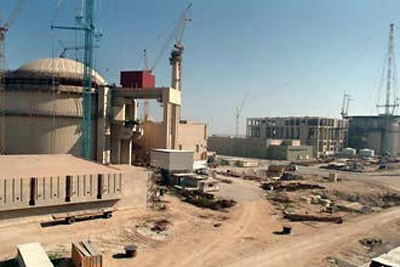Untitled Document

THE Israeli finance minister, Benjamin Netanyahu, has warned that the West must
do more to counter Iran’s potential nuclear threat following the election
last month of Mahmoud Ahmadinejad, the hardline mayor of Tehran, as president
of the country.
Netanyahu, in London to address a conference, said concerted action was required
to rein in Iran, not least because of its links with Islamic terrorist groups
such as Hezbollah and Hamas. He said he wanted the shipment of Russian nuclear
equipment and nuclear fuel to a plant under construction at Bushehr to be stopped.
“The Iranian regime supports terror, both ideologically and operationally,”
he said. “I think the regime will go as fast as it can to develop nuclear
weapons, regardless of who leads it.”
Netanyahu, prime minister from 1996-9, said that if Iran succeeded in developing
nuclear weapons it would boost radical Islamic groups by providing them with
“a nuclear umbrella”.
“This is not an Israel problem — this is a world problem that concerns
everybody, including Russia,” he said. “There has to be a common
solution here: first to prevent the transfer of nuclear technology or fuel,
secondly to punish regimes that deviate from this and, thirdly, to put pressure
on the Iranian regime, in all avenues possible, to stop this programme.”
Netanyahu contrasted Iran’s apparent determination to develop nuclear
weapons with Libya’s decision to abandon its own fledgling programme in
response to the American attack on Iraq. “The deterrent effect has worked
on some, but so far has not worked on others,” he said.
Asked whether there would ultimately have to be a military solution to the
problem — perhaps involving a repetition of Israel’s pre-emptive
strike on Iraq’s Osirak nuclear reactor in June 1981 — Netanyahu
replied: “I don’t know.” He added: “I am not aware of
any plans, but that doesn’t mean they don’t exist, for example in
America.”
Netanyahu, who has been critical of the plan by Ariel Sharon, the Israeli prime
minister, to withdraw from settlements in Gaza next month, was sceptical that
any concessions by Tel Aviv towards the Palestinians would reduce the threat
from terrorists.
He said the Palestinian issue was far down the list of grievances cited by
Al-Qaeda and other Islamic groups. If Israel were to conclude a peace treaty
with the Palestinians, it would be rejected by such Islamic groups, which viewed
the Jewish state as a cancer that must be excised.

